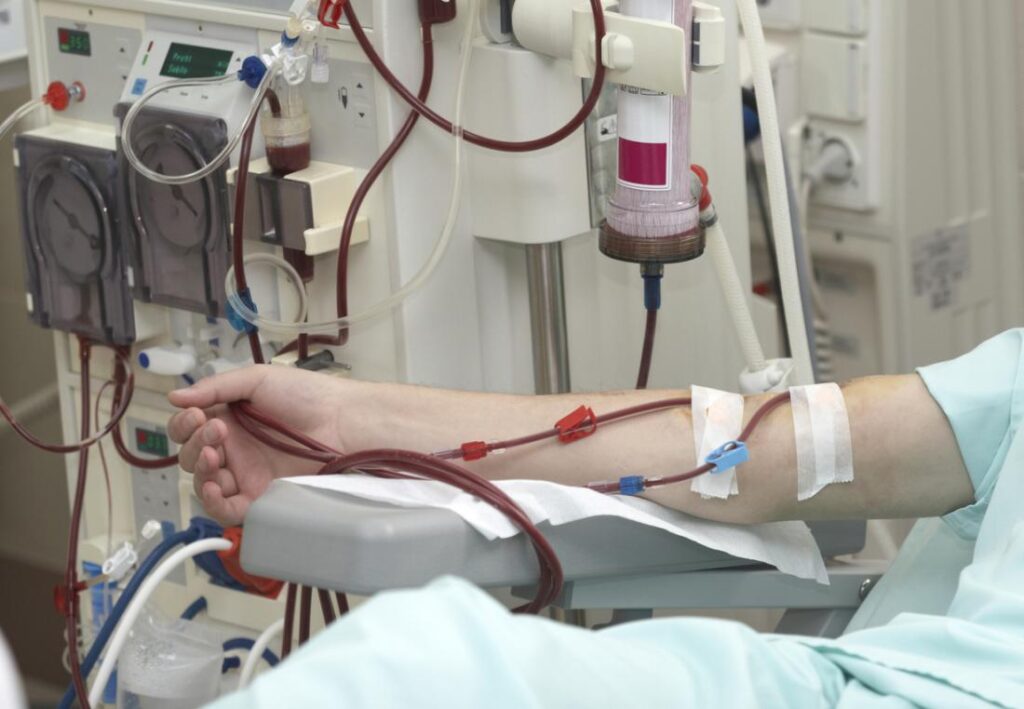Managing diabetes effectively becomes significantly more complex when a patient also requires dialysis. The interplay between diabetes and kidney disease presents unique challenges that demand a nuanced approach to care. This guide aims to shed light on the intricacies of managing diabetes in individuals undergoing dialysis, offering insights into the management of diabetes in dialysis patients, adapting dietary needs, and modifying medication regimens.
Contents
Challenges In Management Of Diabetes In Dialysis Patients
 Managing diabetes in patients who are on dialysis presents a complex set of challenges. These challenges arise from the need to balance the management of two serious conditions: diabetes, a disorder of blood glucose control, and kidney failure, which necessitates dialysis. Here are the main challenges involved in the management of diabetes in dialysis patients:
Managing diabetes in patients who are on dialysis presents a complex set of challenges. These challenges arise from the need to balance the management of two serious conditions: diabetes, a disorder of blood glucose control, and kidney failure, which necessitates dialysis. Here are the main challenges involved in the management of diabetes in dialysis patients:
1. Fluid and Electrolyte Imbalance
- Fluid Retention: Dialysis patients often have fluid retention issues, which can affect blood glucose readings and insulin needs.
- Potassium Levels: Dialysis affects potassium levels, which can interact with insulin and glucose metabolism, necessitating careful monitoring.
2. Hypoglycemia Risk
- Increased Sensitivity to Insulin: The clearance of insulin by the kidneys is reduced in patients with kidney failure. And, leading to prolonged insulin action and an increased risk of hypoglycemia.
- Altered Glucose Metabolism: Changes in glucose production and utilization during dialysis can further complicate blood sugar control, increasing the risk of both hyperglycemia and hypoglycemia.
3. Dietary Restrictions
- Complex Dietary Needs: Managing diabetes requires careful attention to diet. But kidney disease also imposes its dietary restrictions, making it challenging to find a diet that addresses both conditions.
- Nutrient Intake: The need to limit certain nutrients such as potassium, phosphorus, and fluids can interfere with the usual dietary recommendations for diabetes management.
4. Glucose Control During Dialysis
- Variability in Glucose Levels: Dialysis can lead to fluctuations in glucose levels due to the removal of glucose from the blood and the use of glucose-containing dialysate in some types of dialysis.
- Monitoring Challenges: Frequent monitoring of blood glucose levels is necessary, but achieving stable control can be difficult.
These challenges highlight the need for a tailored approach to the management of diabetes in dialysis patients. This is with a focus on individualized treatment plans and lifestyle to achieve the best possible outcomes.
How Do You Maintain Blood Sugar During Dialysis?
 Maintaining blood sugar levels during dialysis requires a careful, coordinated approach due to the unique challenges faced by patients with diabetes undergoing this treatment. Here are key strategies to manage blood sugar effectively during dialysis:
Maintaining blood sugar levels during dialysis requires a careful, coordinated approach due to the unique challenges faced by patients with diabetes undergoing this treatment. Here are key strategies to manage blood sugar effectively during dialysis:
Close Monitoring of Blood Glucose Levels
This practice should include checks before, during, and after dialysis sessions. Frequent testing helps in identifying how dialysis affects blood sugar levels and guides necessary adjustments to treatment. Continuous Glucose Monitoring (CGM) devices offer real-time insights into glucose trends, enabling timely interventions to prevent hyperglycemia and hypoglycemia. These devices can be particularly beneficial in adjusting insulin dosages and dietary intake to maintain glucose levels within target ranges.
Adjustment of Diabetes Medications
Insulin sensitivity often increases due to the altered physiology in dialysis patients, necessitating careful insulin dose adjustments to avoid hypoglycemia. Moreover, the dosages of oral diabetes medications, particularly those metabolized by the kidneys, may need revision to prevent drug accumulation and subsequent toxicity. Collaboration with healthcare professionals is essential to tailor medication regimens that safely address the dual demands of diabetes and dialysis treatments.
Dialysis-Specific Considerations
Dialysis itself presents specific factors that can influence blood sugar levels. The glucose concentration in the dialysate (the fluid used in dialysis) can affect glucose levels in the body. Some patients may require dialysate with higher or lower glucose concentrations, depending on their blood glucose monitoring results. Additionally, the timing of dialysis sessions relative to meals and medication schedules plays a critical role in maintaining glucose control, necessitating adjustments to avoid glycemic imbalances.
Physical Activity
Regular, appropriate physical activity can enhance insulin sensitivity and aid in blood sugar management. However, the type and timing of exercise may require modifications to accommodate the physical constraints and schedule of dialysis treatments. Consulting with healthcare providers to develop an exercise plan that considers individual health status, physical ability, and dialysis schedule is vital for safety.
Education and Support
Empowering patients with diabetes education is crucial for effective self-management, particularly in the context of dialysis. Diabetes self-management education programs can provide valuable knowledge and skills, helping patients navigate the complexities of managing their condition. Additionally, support groups offer a platform for sharing experiences and strategies, providing emotional support and practical tips from others navigating similar challenges.
Coordination of Care
A coordinated approach involving a multidisciplinary healthcare team is essential for the comprehensive management of diabetes in dialysis patients. This team typically includes nephrologists, endocrinologists, diabetes educators, dietitians, and potentially other specialists. Effective communication and collaboration among team members are crucial for synchronizing treatments, monitoring progress, and making necessary adjustments to the care plan.
Overall, managing blood sugar levels during dialysis demands a comprehensive, coordinated approach tailored to individual needs and circumstances.
Can I Give Insulin During Dialysis?
 Yes, insulin can be given during dialysis, and it’s a common practice for managing diabetes in patients undergoing this treatment. However, administering insulin during dialysis requires careful consideration and planning due to changes in glucose levels that can occur during the dialysis process. Here’s how insulin use is typically managed in the context of dialysis:
Yes, insulin can be given during dialysis, and it’s a common practice for managing diabetes in patients undergoing this treatment. However, administering insulin during dialysis requires careful consideration and planning due to changes in glucose levels that can occur during the dialysis process. Here’s how insulin use is typically managed in the context of dialysis:
- Adjusting Insulin Doses
The need for insulin may change on dialysis days due to the removal of glucose from the blood by the dialysis process itself and because the kidneys play a role in insulin metabolism. Patients with kidney failure may experience prolonged insulin action because the kidneys are less able to break down insulin. This can lead to a risk of hypoglycemia.
- Use of Continuous Glucose Monitoring (CGM)
For some patients, the use of Continuous Glucose Monitoring (CGM) systems can provide valuable real-time insights into glucose trends. And, helping to guide more precise adjustments in insulin dosing during dialysis.
- Route of Administration
Insulin may be administered subcutaneously or directly into the dialysis line, depending on the protocol of the dialysis center and the specific needs of the patient. Intravenous administration during dialysis allows for rapid action and adjustments based on glucose levels but requires careful monitoring.
- Safety Precautions
To ensure safety, protocols for managing hypoglycemia should be in place during dialysis sessions. Patients and healthcare providers should be prepared to address low blood glucose levels promptly to prevent severe hypoglycemia.
Overall, while insulin can be safely given during dialysis, it requires careful management and coordination among healthcare providers and the patient. Adjustments to insulin dosing and frequent monitoring of blood glucose levels are essential.
Dietary Adjustments For Management Of Diabetes In Dialysis Patients
 Dietary management for diabetes in dialysis patients is uniquely challenging due to the need to balance the dietary requirements of both conditions. Here are some key dietary adjustments and considerations:
Dietary management for diabetes in dialysis patients is uniquely challenging due to the need to balance the dietary requirements of both conditions. Here are some key dietary adjustments and considerations:
Carbohydrate Management
- Consistent Carbohydrate Intake: It’s important to maintain a consistent carbohydrate intake at each meal to help manage blood sugar levels. Focus on high-fiber carbohydrates such as whole grains, fruits, and vegetables, which have a lower glycemic index and can help in blood sugar control.
- Monitoring Portions: Carefully monitor portion sizes to ensure carbohydrate intake is balanced with medication and insulin therapy to avoid blood sugar spikes.
Protein Intake
- Adequate Protein: Dialysis patients need a higher amount of protein to compensate for losses during treatment, but this must be balanced with diabetes management. High-quality protein sources, including lean meats, poultry, fish, and plant-based proteins, should be emphasized.
- Protein Needs: The exact protein needs can vary. So it’s essential to work with a dietitian to determine the appropriate amount based on individual health status, dialysis treatment, and nutritional needs.
Fluid Restrictions
- Fluid Intake: Dialysis patients often need to limit fluid intake to prevent fluid overload, which can be challenging with diabetes, as high blood glucose levels can lead to dehydration. Monitoring and measuring fluid intake can help manage this balance.
- Including Foods That Turn to Liquids: Be mindful of foods that are liquid at room temperature, such as ice cream or gelatin, as these count towards the fluid allowance.
Potassium and Phosphorus Control
- Limiting High-Potassium Foods: Both diabetes and kidney disease patients need to monitor potassium intake to avoid hyperkalemia. High-potassium foods, such as bananas, oranges, potatoes, and tomatoes, may need to be limited or avoided.
- Phosphorus Restrictions: High phosphorus levels can be harmful to dialysis patients. Foods high in phosphorus, like dairy products, nuts, seeds, and whole grains, may need to be limited. Phosphorus additives found in processed foods should also be avoided.
Sodium Reduction
- Lower Sodium Intake: Reducing sodium intake can help manage blood pressure, a common issue in both diabetes and kidney disease patients. Avoid processed foods, canned goods, and salty snacks, and use herbs and spices for flavoring instead of salt.
By carefully adjusting the diet to meet the unique needs of managing diabetes in the context of dialysis, patients can better control their blood glucose levels, support their dialysis treatment, and improve their overall health outcomes.
Conclusion
Management of diabetes in dialysis patients presents a unique set of challenges that require careful attention to medication, diet, and lifestyle. By closely monitoring blood sugar levels, adjusting insulin and diabetes medications as needed, and following specific dietary guidelines that cater to both diabetes and kidney disease, patients can maintain better control over their health. Regular consultation with healthcare professionals is essential.
Ultimately, through personalized care plans and proactive management, individuals can achieve a higher quality of life and minimize the risk of complications. Do you want to get rid of diabetes? Join our online diabetes treatment program and reverse Diabetes naturally through lifestyle changes such as a Personalized Diet plan, Exercise, Yoga, dieticians, and health coaches.

